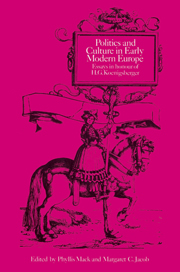Book contents
- Frontmatter
- Contents
- Introduction
- The court of the Spanish Habsburgs: a peculiar institution?
- The magnificent Lorenzo de' Medici: between myth and history
- Political rhetoric and poetic meaning in Renaissance culture: Clément Marot and the Field of Cloth of Gold
- The unlikely Machiavellian: William of Orange and the princely virtues
- The Estates of Brabant to the end of the fifteenth century: the make-up of the assembly
- Presents and pensions: a methodological search and the case study of Count Nils Bielke's prosecution for treason in connection with gratifications from France
- Between Bruni and Machiavelli: history, law and historicism in Poggio Bracciolini
- Constitutional discourse in France, 1527–1549
- Lieuwe van Aitzema: a soured but knowing eye
- John Calvin's contribution to representative government
- Luther and the humanists
- Scholars and ecclesiastical history in the Early Modern period: the influence of Ferdinando Ughelli
- ‘By an Orphean charm’: science and the two cultures in seventeenth-century England
- The crisis of the European mind: Hazard revisited
- Isaac Beeckman and music
- Decadence, shift, cultural changes and the universality of Leonardo da Vinci
- Bibliography of the writings of HELMUT GEORG KOENIGSBERGER
- Index
Political rhetoric and poetic meaning in Renaissance culture: Clément Marot and the Field of Cloth of Gold
Published online by Cambridge University Press: 20 October 2009
- Frontmatter
- Contents
- Introduction
- The court of the Spanish Habsburgs: a peculiar institution?
- The magnificent Lorenzo de' Medici: between myth and history
- Political rhetoric and poetic meaning in Renaissance culture: Clément Marot and the Field of Cloth of Gold
- The unlikely Machiavellian: William of Orange and the princely virtues
- The Estates of Brabant to the end of the fifteenth century: the make-up of the assembly
- Presents and pensions: a methodological search and the case study of Count Nils Bielke's prosecution for treason in connection with gratifications from France
- Between Bruni and Machiavelli: history, law and historicism in Poggio Bracciolini
- Constitutional discourse in France, 1527–1549
- Lieuwe van Aitzema: a soured but knowing eye
- John Calvin's contribution to representative government
- Luther and the humanists
- Scholars and ecclesiastical history in the Early Modern period: the influence of Ferdinando Ughelli
- ‘By an Orphean charm’: science and the two cultures in seventeenth-century England
- The crisis of the European mind: Hazard revisited
- Isaac Beeckman and music
- Decadence, shift, cultural changes and the universality of Leonardo da Vinci
- Bibliography of the writings of HELMUT GEORG KOENIGSBERGER
- Index
Summary
… men might say,
Till this time pomp was single, but now married
To one above itself. Each following day
Became the next day's master, till the last
Made former wonders its. To-day the French
All clinquant, all in gold, like heathen gods,
Shone down the English; and to-morrow they
Made Britain India: every man that stood
Show'd like a mine.
Shakespeare, Henry VIII‘The Field of Cloth of Gold’ was the name given to a meeting between Francis I of France and Henry VIII of England in June, 1520. The meeting lasted for twenty days, during which the kings visited, dined, jousted and excelled in theatrical acts of courtesy and friendship. Henry held court in a specially built summer palace with an embattled gate ornamented with statues of men in various attitudes of war, ceilings covered with white silk, roofs studded with roses on a ground of gold, banners painted by Holbein, the whole supported by a great pillar wreathed in gold, surrounded by four gilt lions and surmounted by a blind Cupid. Francis rested in a tent ‘as high as the tallest tower’, with thirty-two sides, covered in cloth of gold with stripes of blue velvet ‘powdered’ with golden fleurs-de-lis, and attached to the tent by violet taffeta imported from Italy. At the summit stood a life-size statue of St. Michael, patron saint of France and of the royal order of chivalry.
- Type
- Chapter
- Information
- Politics and Culture in Early Modern EuropeEssays in Honour of H. G. Koenigsberger, pp. 59 - 84Publisher: Cambridge University PressPrint publication year: 1987



